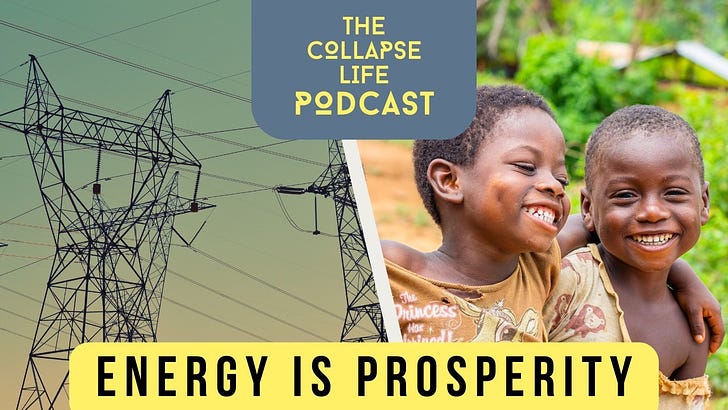Notes from the edge of civilization: June 30, 2024
Even high earners are struggling; what happens when you destroy money; fossil fuels for Africa; and more.
It’s no surprise Americans have money on the mind these days. Only 39% of renters make enough to afford a median-priced apartment in America, according to a new Redfin analysis. The average US renter earns $54,712 a year; but to afford the median rent of $1,653 per month, they'd need to make $66,120. That's more than an $11,000 shortfall.
The situation is acute in New York and Miami, where the typical renter earns roughly 40% less than they need to afford the typical apartment; similar conditions exist in Boston and Los Angeles. In fact, the analysis found the average renter earns enough to afford the median-priced apartment in just five of the metros analyzed: Austin, Houston, Phoenix, Washington, D.C., and Dallas.
Even those making over $100,000 a year are concerned about their financial future, according to a new survey from the Federal Reserve Bank of Philadelphia.
Bloomberg summarized the key findings:
Among those able to pay their bills in full in April, more than a quarter said they worry about the next six months, up from a fifth the year before. Higher earners were the most likely of the income groups to be in that category: about 30% of those making at least $150,000 reported being concerned about their finances in the next six months.
Nearly 70% of respondents reported using coping strategies to pay monthly bills over the last 12 months. Cutting discretionary spending (e.g., entertainment or dining out) was most common, followed by cutting essential spending (e.g., food or medical care).
About 1 in 3 said they had borrowed money, either from friends and family or from formal lending markets. “A sizable portion of respondents (15.8 percent) paid less or skipped monthly debts,” the report said, “and 13.1 percent selected taking an additional job.” About a quarter of those earning more than $100,000 took money out of retirement savings early (e.g., 401k plans) to cover monthly expenses.
In a Substack titled What Happens When You Destroy Money, British humorist and economics writer, Dominic Frisby, describes daily life for young people in Turkey, where the currency has lost much of its purchasing power recently.
Given the US statistics mentioned above, Frisby’s recent stop in Istanbul — during which he spoke to two young professionals, Emre, 25, and İlker, 27, about life under the lira — offers a chilling glimpse into what life in North America might soon look like:
“There is no point saving. When we were students a few years ago, you could save for maybe three years and buy a car. Now it would take you 20 years. There is no point saving in lira. We spend the money as soon as we have it.”
“Even on stupid things,” added Emre, pointing to his Casio watch. “You may as well.”
They spend as soon as they earn. There is no point saving a currency that will soon be worth less. The rates of interest paid do not compensate, especially given that you usually have to tie your money up for one, two, or three years to obtain decent rates, and the inflation risk of doing that is too great.

When you put too much economic pressure on an already struggling population, the results look like what we saw in Kenya earlier this week where proposed tax hikes led to massive street protests, the Parliament building being stormed, buildings set alight, and an eventual retreat by the government.
In response to a national debt crisis that has the country owing $80 billion in loans from a variety of international creditors, President William Ruto proposed a finance bill to increase government revenue by taxing citizens, including levies on everyday items like bread, cooking oil, and diapers.
Young Kenyans, who are already struggling with high unemployment rates, were having none of it, particularly because of Ruto’s alleged corruption and his much-hated, jet set lifestyle.
As Reuters reports:
In the two years since he was elected, Kenya's President William Ruto has wowed global climate activists under the Eiffel Tower, brushed shoulders with global tech titans in Silicon Valley, and was toasted as a global peacekeeper at the White House.
As he notched up dozens of foreign trips, however, citizens back home endured gruelling economic hardship.
Already hammered by a cost-of-living crisis and watching those in government enjoy the largesse derived from their positions, Kenyans forced Ruto to ditch plans to introduce eye-watering tax hikes after days of protests.
Here’s how one young Kenyan activist, Jusper Machogu, characterized what just happened:
The climate alarmist president, who is also an IMF, WB [World Bank] and Western puppet, picked up this over-taxation document as a way to build the economy. His closest friends literally walk with money stashed in bags and drop them in churches...with $200,000 as a typical donation for one church!
Ruto has been on international tours from week to week - a president of the skies! He paid as much as $3,000,000 to visit the US on a luxurious private jet! Nobody knows what the hell Ruto sold to the US (we have a bad taste imagining the US gov wants to be friends).

Machogu is the founder of Fossil Fuels for Africa, a campaign that supports expanded access to energy to develop African economies. He holds similar views to our podcast guest last week, Jason Isaac who stated in no uncertain terms that, access to energy will end poverty around the globe.
“I want Fossil Fuel fertilizer for my mum to replace backbreaking manure,” Machogu tweeted.
I want my mum to have tap water.
I want my mum to have a refrigerator someday.
I want my mum to have access to a simple machine and others tractors to stop toil in Africa.
I want reliable versatile energy for my people so they can add value to various products and industrialize.
I want my people to have what the West has - prosperity!
I want Fossil Fuels for my people.
The BBC calls Machogu a climate denier whose online followers in the US, the UK, and Canada “also promote conspiracy theories online - not just about climate change, but also about vaccines, Covid-19, or the war in Ukraine.” As far as we’re concerned, that’s a badge of honor. Well done, Jusper Machogu!
Energy is the key to ending poverty
Trigger warning: the following post may upset you if you suffer from a chronic fear of environmental doom related to traditional forms of energy. If you experience stress from this content, step away from your device, grab the nearest recycled, unbleached paper bag and breathe deeply into it four or five times, or until breathing returns to normal.
Before we wish you a productive week ahead, don’t forget to register for our upcoming ‘Ask Me Anything’ with the renowned Will Falconer, DVM. Click below to get your tickets!
Here’s more from Dr. Falconer’s latest newsletter, Vital Animal News:
It’s been 44 years in vet medicine this year, the majority of them as a homeopathic vet, so I’ve had a lot of insights from my cases, and from the many questions and comments you’ve brought me since my blog began in 2008.
Before I had retrained in any natural modalities of treatment, I saw amazing results with raw feeding. Changing the diet clearly changed the animal’s health trajectory.
Acupuncture certification followed, and needles were (somewhat) magical, as well. From flamingos regaining their color at a swank Maui resort to a bleach poisoned dog waking up in my little home office, I realized first hand energetic medicine clearly was real.
But it was during my homeopathic training in ’92-’93 that my mind was really set to reeling.
That’s when I learned about vaccinosis (a 200 year old term still very applicable today, meaning vaccine injury).
And, soon after realizing that this was my medicine path, my “homeopathic honeymoon” began and I witnessed the power of these impossibly dilute remedies curing serious disease.







Thanks for the share :)
Good for the Kenyans. Governments rule by the consent of the people. That consent can be withdrawn.
What has broken that model is the advent of modern weapons and these awful governments being unilaterally armed to the point that they can ignore the people. Usually funded by outside interests. That has fueled an exodus from these countries that is inundating the rest of the world. They really have no hope to change their government where they are.
Of course countries in the west look longingly at that type of power as well. The whole characterization of "populist" as being a bad thing in a democratic society where the people are supposed to choose their own leadership is anathema. The target for their derision is anyone who is against their continued power. They will portray anyone outside of their privileged class as being a danger to society to authorize them to be crushed.